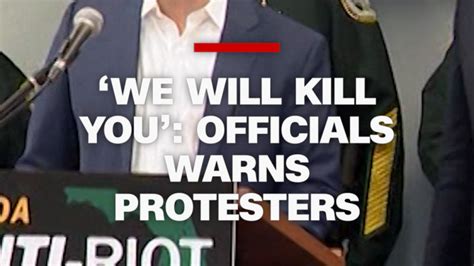
A Florida sheriff issued a stark warning to potential protesters, stating, “If you try to break into a house, loot, steal, I’m highly recommending you leave town because we’re going to treat you like we’re meeting you at the door, going to kill you.” Grady Judd, the sheriff of Polk County, made these remarks during a press conference on Tuesday regarding the arrest of 214 individuals on various charges.
Polk County Sheriff Grady Judd issued a controversial warning to potential looters and rioters during a press conference this week, stating that they could face deadly force from law enforcement if they engaged in criminal activities within the county. The sheriff’s remarks, made in the context of announcing the arrest of 214 individuals on 424 felony and misdemeanor charges, have sparked widespread debate about the appropriate use of force and the boundaries of law enforcement rhetoric.
Sheriff Judd began by highlighting the success of “Operation Summer Surge,” a law enforcement initiative aimed at curbing crime in Polk County. He outlined the various charges filed against those arrested, ranging from drug offenses to violent crimes. It was during this presentation that he shifted to addressing potential unrest, seemingly in response to recent protests and instances of looting in other parts of the country.
“We only have one thing that we ask of you,” Judd stated, referring to the public. “Don’t mess with us. Don’t even think about it. Because if you do, I promise you, we’re going to do everything we can to arrest you, and you’re going to go to jail.”
He then escalated his warning, specifically targeting those who might consider breaking into homes or looting businesses. “If you try to break into a house to steal, to burglarize, loot, we’re going to treat you like you’re coming to our house. You can rest assured that will be shot,” he declared. “We’re highly recommending you leave town because we’re going to treat you like we’re meeting you at the door, going to kill you.”
The sheriff’s comments have drawn both support and condemnation. Supporters argue that Judd is simply sending a strong message to deter criminal activity and protect the citizens of Polk County. They believe his tough stance is necessary to maintain law and order and prevent the kind of destruction and violence that has been seen in other cities.
Critics, however, accuse Judd of inciting violence and promoting a dangerous “shoot first, ask questions later” mentality. They argue that his remarks could lead to excessive use of force by law enforcement and potentially endanger innocent lives. Some legal experts have also questioned the legality of Judd’s statements, suggesting they could be interpreted as an endorsement of extrajudicial killings.
The American Civil Liberties Union (ACLU) has not yet released an official statement regarding Sheriff Judd’s comments, but similar statements by law enforcement officials in the past have drawn strong criticism from the organization. The ACLU typically argues that such pronouncements undermine the principles of due process and the right to protest peacefully.
The controversy surrounding Sheriff Judd’s remarks highlights the ongoing tension between maintaining law and order and protecting civil liberties. Law enforcement officials are tasked with ensuring public safety, but they must also operate within the bounds of the law and respect the rights of all citizens. The debate over Judd’s comments underscores the difficulty of striking this balance, particularly in a highly charged political climate.
This is not the first time Sheriff Judd has made headlines for his controversial statements. He has a long history of outspoken remarks on a variety of issues, often taking a hard-line stance on crime and law enforcement. His supporters see him as a no-nonsense leader who is unafraid to speak his mind, while his critics view him as a demagogue who uses inflammatory rhetoric to appeal to his base.
The Polk County Sheriff’s Office has not issued any further clarification or retraction of Judd’s remarks. It remains to be seen whether the controversy will have any impact on the office’s policies or practices. However, the incident serves as a reminder of the importance of holding law enforcement officials accountable for their words and actions.
The potential consequences of Sheriff Judd’s statements are far-reaching. They could embolden vigilantes, create a climate of fear and distrust, and further erode the relationship between law enforcement and the communities they serve. It is crucial that law enforcement officials exercise restraint and avoid language that could be interpreted as an endorsement of violence or a disregard for the rule of law.
The First Amendment protects the right to protest peacefully, even when those protests are unpopular or controversial. While law enforcement has a legitimate interest in maintaining order and preventing violence, they must do so in a way that respects the constitutional rights of all citizens. Sheriff Judd’s remarks raise serious questions about whether he is committed to upholding these principles.
The debate over Sheriff Judd’s comments is likely to continue for some time. It is a debate that goes to the heart of fundamental questions about the role of law enforcement in a democratic society. How do we balance the need for security with the protection of civil liberties? How do we ensure that law enforcement officials are held accountable for their actions? These are questions that we must continue to grapple with as we strive to create a more just and equitable society.
Sheriff Judd’s stance reflects a broader trend in some law enforcement circles towards a more aggressive and militarized approach to policing. This trend has been fueled by factors such as the war on drugs, the rise of terrorism, and the increasing availability of military-grade equipment to local police departments. While proponents of this approach argue that it is necessary to combat crime and protect public safety, critics warn that it can lead to excessive force, racial profiling, and a breakdown of trust between law enforcement and the community.
The events in Polk County highlight the need for greater transparency and accountability in law enforcement. Police departments should be required to collect and report data on the use of force, racial profiling, and other key metrics. They should also establish independent civilian oversight boards to investigate complaints of police misconduct. By increasing transparency and accountability, we can help to ensure that law enforcement officials are held to the highest standards of conduct.
In addition to the legal and ethical concerns raised by Sheriff Judd’s remarks, there are also practical considerations. It is unlikely that his warning will deter criminals from committing crimes. In fact, it could have the opposite effect, emboldening them to resist arrest and escalate conflicts with law enforcement. A more effective approach to crime prevention would involve investing in community-based programs that address the root causes of crime, such as poverty, lack of education, and substance abuse.
The controversy surrounding Sheriff Judd’s comments underscores the importance of having a well-informed and engaged citizenry. It is up to us to hold our elected officials accountable for their words and actions. We must demand that they uphold the principles of justice, fairness, and equality. We must also be willing to engage in difficult conversations about race, crime, and policing. Only by working together can we create a society where everyone is safe and treated with respect.
The reaction to Sheriff Judd’s comments has been predictably divided along political lines. Conservatives have generally defended Judd’s remarks, arguing that he is simply doing his job to protect the citizens of Polk County. Liberals, on the other hand, have condemned Judd’s comments as irresponsible and dangerous, arguing that they could lead to violence and abuse of power. This polarization reflects a broader trend in American politics, where even seemingly non-political issues are often viewed through a partisan lens.
The incident also raises questions about the role of social media in shaping public opinion. Sheriff Judd’s comments quickly went viral on social media, sparking a flurry of debate and criticism. Social media can be a powerful tool for holding public officials accountable, but it can also be used to spread misinformation and incite hatred. It is important to be critical of the information we consume on social media and to avoid sharing content that is inflammatory or unsubstantiated.
The events in Polk County serve as a reminder that the fight for justice and equality is far from over. We must continue to challenge injustice wherever we find it, and we must never give up on the dream of a society where everyone is treated with dignity and respect. This requires a commitment to dialogue, understanding, and empathy. It also requires a willingness to stand up for what is right, even when it is difficult or unpopular.
The long-term impact of Sheriff Judd’s comments remains to be seen. However, one thing is clear: they have touched a nerve in American society. They have sparked a debate about the role of law enforcement, the limits of free speech, and the ongoing struggle for justice and equality. This debate is essential for the health of our democracy. It is through open and honest dialogue that we can find common ground and build a better future for all.
The Polk County Sheriff’s Office has faced scrutiny in the past for incidents involving the use of force. While the office maintains that its officers are trained to use force responsibly and only when necessary, critics argue that there is a pattern of excessive force and a lack of accountability. Sheriff Judd’s comments are likely to exacerbate these concerns and further erode trust in the office.
The incident also raises questions about the qualifications and training of law enforcement officers. Police officers are given a great deal of power, and it is essential that they are properly trained to use that power responsibly. This includes training in de-escalation techniques, conflict resolution, and cultural sensitivity. It is also important that police officers are held to the highest ethical standards and that they are held accountable for any misconduct.
The controversy surrounding Sheriff Judd’s comments underscores the need for comprehensive police reform. This reform should include measures to increase transparency and accountability, improve training and qualifications, and address the root causes of crime. It should also involve a commitment to building trust between law enforcement and the communities they serve. Only through comprehensive reform can we create a system of policing that is both effective and just.
The events in Polk County serve as a reminder that we all have a role to play in promoting justice and equality. We must be willing to speak out against injustice, to hold our elected officials accountable, and to work together to build a more just and equitable society. This is not just the responsibility of law enforcement; it is the responsibility of all of us.
Sheriff Judd’s remarks also highlight the issue of qualified immunity, a legal doctrine that protects government officials from liability in civil lawsuits unless their conduct violates clearly established statutory or constitutional rights, and there’s no reasonable argument that they were unaware their conduct violated the law. Critics argue that qualified immunity makes it difficult to hold law enforcement officers accountable for misconduct and that it should be reformed or abolished. Proponents argue that it protects officers from frivolous lawsuits and allows them to do their jobs without fear of being sued.
The potential for misinterpretation of Sheriff Judd’s statement is significant. His strong language, while possibly intended to deter crime, could be misconstrued by both law enforcement and civilians. Some officers might take it as a license to use deadly force more readily, while some civilians might interpret it as a threat to their right to protest or express dissent. Clear and unambiguous communication from law enforcement is crucial to avoid such misunderstandings.
Finally, it is important to consider the potential impact of Sheriff Judd’s comments on the mental health of the community. His strong language could create anxiety and fear, particularly among vulnerable populations. Law enforcement officials should be mindful of the potential psychological impact of their words and actions and should strive to communicate in a way that is both firm and reassuring.
The situation in Polk County serves as a microcosm of the larger challenges facing American society. We are a nation deeply divided along political, racial, and economic lines. We must find ways to bridge these divides and to work together to create a society where everyone has the opportunity to thrive. This requires a commitment to empathy, understanding, and a willingness to engage in difficult conversations. It also requires strong leadership from our elected officials.
Sheriff Judd’s comments, regardless of intent, serve as a stark reminder of the power of words and the responsibility that comes with holding a position of authority.
Frequently Asked Questions (FAQ)
-
What exactly did Sheriff Judd say?
Sheriff Grady Judd of Polk County, Florida, stated, “If you try to break into a house to steal, to burglarize, loot, we’re going to treat you like you’re coming to our house. You can rest assured that will be shot,” and “We’re highly recommending you leave town because we’re going to treat you like we’re meeting you at the door, going to kill you.” This statement was made during a press conference announcing the arrest of 214 individuals on various charges.
-
Why did Sheriff Judd make these comments?
The comments were made during a press conference where Sheriff Judd was discussing “Operation Summer Surge,” a law enforcement initiative aimed at curbing crime. The remarks appeared to be a warning to potential looters and rioters, seemingly in response to recent protests and instances of looting in other parts of the country.
-
What has been the reaction to Sheriff Judd’s statement?
The reaction has been divided. Supporters argue that Judd is sending a strong message to deter criminal activity and protect the citizens of Polk County. Critics accuse him of inciting violence and promoting a dangerous “shoot first, ask questions later” mentality, potentially endangering innocent lives.
-
Is it legal for law enforcement to say they will “kill” looters?
The legality is debatable and context-dependent. While law enforcement is authorized to use deadly force in situations where there is an imminent threat of death or serious bodily harm to themselves or others, the specific circumstances of each situation are crucial. Blanket statements suggesting the use of deadly force against property crimes are controversial and may be subject to legal challenge. Legal experts have questioned whether Judd’s statement constitutes an endorsement of extrajudicial killings.
-
What are the potential consequences of Sheriff Judd’s comments?
The potential consequences include:
- Escalation of Violence: The comments could embolden both vigilantes and criminals, leading to increased violence and confrontation.
- Erosion of Trust: The remarks could further damage the relationship between law enforcement and the community, particularly among marginalized groups.
- Legal Challenges: The statement could be used in legal challenges against the Polk County Sheriff’s Office in cases involving the use of force.
- Chilling Effect on Protests: The comments could discourage peaceful protests and dissent, creating a climate of fear and self-censorship.
- Misinterpretation by Officers: Law enforcement officers might misinterpret the statement as a license to use deadly force more readily.
-
Has Sheriff Judd made similar statements in the past?
Yes, Sheriff Judd has a history of making controversial and outspoken remarks on various issues related to crime and law enforcement. He is known for taking a hard-line stance and his comments often generate both support and criticism.
- What does the ACLU say about statements like these?
The ACLU has not specifically commented on this instance, but generally, they would be critical of any statement from law enforcement that appears to endorse violence or disregard due process. They typically advocate for de-escalation and respect for constitutional rights during protests.
- What is “Operation Summer Surge”?
“Operation Summer Surge” is a law enforcement initiative by the Polk County Sheriff’s Office aimed at curbing crime during the summer months. During the press conference, Sheriff Judd highlighted this operation and the arrests made as part of the initiative.
- What is qualified immunity and how does it relate to this situation?
Qualified immunity is a legal doctrine that protects government officials, including law enforcement, from liability in civil lawsuits unless their conduct violates clearly established statutory or constitutional rights, and there’s no reasonable argument they were unaware their conduct violated the law. Critics argue it shields officers from accountability, while proponents say it protects them from frivolous lawsuits. The comments by Sheriff Judd could potentially be tested under qualified immunity if an officer were to act on what some might consider an encouragement for excessive force.
- What should citizens do if they feel their rights have been violated by law enforcement?
Citizens who believe their rights have been violated by law enforcement should document the incident as thoroughly as possible, including names, badge numbers, and specific details of what occurred. They should then seek legal counsel from a qualified attorney who specializes in civil rights law. They can also file a complaint with the internal affairs division of the relevant law enforcement agency and/or contact organizations like the ACLU for assistance.
- What is the role of a sheriff in a county?
A sheriff is the chief law enforcement officer for a county. Their responsibilities typically include enforcing laws, investigating crimes, operating the county jail, providing security for the courts, and serving warrants and civil papers. Sheriffs are usually elected officials, making them directly accountable to the citizens of the county.
- Are there alternatives to using deadly force in these situations?
Yes, there are many alternatives to using deadly force, including de-escalation techniques, verbal warnings, less-lethal weapons (such as Tasers and pepper spray), and physical restraint. Law enforcement agencies are increasingly emphasizing de-escalation training to reduce the use of force.
- How does this event reflect broader issues in American policing?
This event reflects several broader issues in American policing, including:
- Militarization of police: The use of aggressive rhetoric and the potential for increased use of force.
- Racial bias: Concerns about the disproportionate impact of law enforcement on communities of color.
- Lack of accountability: Difficulties in holding law enforcement officers accountable for misconduct.
- Trust deficit: A growing distrust between law enforcement and the communities they serve.
- What measures can be taken to improve community relations with law enforcement?
Measures to improve community relations with law enforcement include:
- Community policing: Building relationships between officers and residents through regular interactions and problem-solving partnerships.
- Transparency and accountability: Making police data and policies publicly available and holding officers accountable for misconduct.
- De-escalation training: Equipping officers with the skills to resolve conflicts peacefully.
- Cultural sensitivity training: Educating officers about the diverse cultures and backgrounds of the people they serve.
- Civilian oversight boards: Establishing independent boards to review police policies and investigate complaints.
- What is the process for investigating police misconduct in Florida?
In Florida, complaints of police misconduct can be filed with the internal affairs division of the relevant law enforcement agency. The agency is then responsible for investigating the complaint. If the investigation finds that misconduct occurred, the officer may face disciplinary action, ranging from a written reprimand to termination. In some cases, the officer may also face criminal charges.
- How are sheriffs elected in Florida?
Sheriffs in Florida are elected by the citizens of the county in which they serve. The election is typically held every four years. Candidates for sheriff must meet certain qualifications, such as being a resident of the county and having law enforcement experience.
- What legal precedent exists for the use of deadly force to protect property?
Generally, the use of deadly force is only justified when there is an imminent threat of death or serious bodily harm to oneself or another person. The use of deadly force solely to protect property is generally not considered justifiable, although laws vary by state.
- What is the role of the State Attorney in Polk County in relation to Sheriff Judd’s statements?
The State Attorney is responsible for prosecuting crimes in Polk County. While they do not directly oversee the Sheriff’s Office, they work closely with law enforcement in investigating and prosecuting cases. The State Attorney would be responsible for reviewing any cases involving the use of force by law enforcement to determine whether the use of force was justified under the law. The State Attorney’s silence on the Sheriff’s statement could be interpreted in various ways, and their future actions will be indicative of their stance.
- What de-escalation tactics are law enforcement officers typically trained in?
De-escalation tactics typically taught to law enforcement officers include:
- Creating distance: Maintaining a safe distance between the officer and the subject to reduce tension.
- Active listening: Paying attention to what the subject is saying and showing empathy.
- Verbal persuasion: Using calm and clear language to try to reason with the subject.
- Slowing things down: Avoiding rushing into a situation and taking time to assess the situation.
- Calling for backup: Requesting assistance from other officers or mental health professionals.
- What are the potential implications of Sheriff Judd’s comments on jury trials involving self-defense claims?
Sheriff Judd’s statement could potentially influence jury trials involving self-defense claims. Defense attorneys might argue that his comments created a climate of fear and encouraged citizens to use deadly force without proper justification. Conversely, prosecutors might argue that his comments were simply intended to deter crime and that citizens have a right to defend themselves and their property. The specific facts of each case would be crucial in determining how the jury would view the situation.
- What other agencies are involved in overseeing law enforcement in Polk County?
Besides the Sheriff’s Office, other agencies involved in overseeing law enforcement in Polk County include:
- Florida Department of Law Enforcement (FDLE): Provides support and assistance to local law enforcement agencies and investigates certain types of crimes.
- Federal Bureau of Investigation (FBI): Investigates federal crimes and may become involved in cases involving civil rights violations or excessive use of force.
- Florida Attorney General’s Office: Can investigate allegations of police misconduct and prosecute criminal cases.
- How can citizens file a complaint against the Polk County Sheriff’s Office?
Citizens can file a complaint against the Polk County Sheriff’s Office by:
- Contacting the Internal Affairs Division: Calling or visiting the Sheriff’s Office and requesting to file a complaint with Internal Affairs.
- Submitting a written complaint: Sending a letter detailing the incident and the officer(s) involved to the Sheriff’s Office.
- Contacting a lawyer: Consulting with an attorney who can assist in filing a formal complaint and pursuing legal action if necessary.
- What are the laws in Florida regarding self-defense and the use of deadly force?
Florida’s self-defense laws, often referred to as “Stand Your Ground” laws, allow individuals to use deadly force in self-defense if they reasonably believe it is necessary to prevent imminent death or great bodily harm to themselves or another, or to prevent the imminent commission of a forcible felony. There is no duty to retreat before using force. However, these laws are complex and highly fact-dependent.
- What is the role of local media in covering these types of events?
Local media plays a critical role in covering these events. They are responsible for:
- Reporting the facts: Providing accurate and unbiased information about what occurred.
- Providing context: Explaining the background and significance of the event.
- Holding public officials accountable: Asking tough questions and investigating potential wrongdoing.
- Providing a forum for public discussion: Allowing different perspectives to be heard and fostering dialogue.
- Monitoring police activity: Keeping an eye on law enforcement and reporting on any potential abuses of power.
- What resources are available for community members who are feeling anxious or fearful as a result of Sheriff Judd’s comments?
Resources available for community members who are feeling anxious or fearful as a result of Sheriff Judd’s comments include:
- Mental health professionals: Therapists, counselors, and psychologists who can provide support and guidance.
- Community organizations: Groups that offer support services and advocacy for marginalized communities.
- Religious leaders: Pastors, imams, and other religious figures who can provide spiritual guidance and support.
- Crisis hotlines: 24-hour hotlines that offer immediate support and resources for people in crisis.
- Local government agencies: Social service agencies that can provide assistance with housing, food, and other basic needs.









